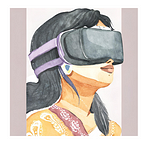I’d spend 10, 000 hours and 10, 000 more, if that’s what it takes to learn…
“Why VR for Medical or Nursing Training?”
I have been asked this question numerous times in the last few months. My colleagues have been asked it more. Medical education is complicated. High stakes are involved. There is no room for error in this field. So, how does one learn to achieve the state of “zero error”?
There is this theory that, if you put 10,000 hours into practicing a particular skill in the correct way, you will achieve expertise. Can a future healthcare professional practice ‘safely’ for those many hours to achieve this coveted expertise? Are the 10,000 hours sufficient?
I recently read a paper written by a surgical resident explaining how much time and effort goes into a 5-year medical residency program. They said that as surgical residents they spend more than 70 hours a week learning and working on their specialisation. Let’s assume that a resident works for 48 weeks a year, they gain approximately 16,800 hours of experience. So are they experts by the end of the program? Did they make mistakes on patients? Is there an immersive way to learn, build skills, and practice safely?
I think it is fair to say that the answer to the first question is no, to the second a may be, and for the final question- a very big yes!
Medicine being a high-risk, and high-value field, a student cannot be considered an expert just because they played by a supposed rule. While the 10,000-hour rule emphasises the importance of extensive practice, there are at least three reasons this rule cannot be applied to medical professionals:
Diversity of Medical Knowledge: Medicine is a vast and ever-evolving field, with various specialties, subspecialties, and interdisciplinary areas. Becoming an expert requires a deep understanding of numerous topics, which cannot be fully grasped within 10,000 hours.
Practical Experience: Medical students need to apply their knowledge in real-world settings, often under high-stress situations and with unpredictable outcomes. This experiential learning cannot be rushed or quantified by a set number of practice hours.
Continuous Learning: Medical professionals need to constantly update their knowledge and skills due to ongoing discoveries and technological advancements in healthcare.
While the 10,000-hour rule can be used as a guideline stress on the importance of extensive practice, using a tool like VR can enhance the quality and efficiency of that practice by offering a controlled, customisable, and immersive learning environment. Here are four ways VR helps in training to build foundations and develop expertise in the medical field:
1. Accelerated Learning: VR allows users to practice and experience a wide range of scenarios and procedures in a shorter amount of time, compared to real-world practice. This condensed exposure can help learners gain experience more quickly.
2. Customisation: VR simulations can be tailored to focus on specific skills or scenarios, allowing learners to target their practice more effectively. This can lead to more efficient skill development and mastery.
3. Immediate Feedback: VR can provide instant feedback and performance analysis, enabling learners to identify and address areas for improvement more effectively than traditional practice methods.
4. Repeated Practice: VR allows for repeated practice of procedures or scenarios without the limitations of real-world resources, such as availability of patients or cadavers.
So when someone asks Why VR? I say that it’s because it’s the best way to build expertise from the beginning of your medical education to when you are a practising professional. It makes collaboration easy. It makes scenario based learning possible in the most enthralling manner. It engages you by immersing you into an actual possible situation, within an environment which looks close to reality. VR for Medical Training, in my humble opinion, is the best possible aid to make your >10,000 hours journey to expertise — safe, enjoyable, and most of all effective.
If you want to talk to someone who knows more of the science behind VR from my team, comment or hit me up at kavya@medisimvr.com. I will put you in touch with them. :)
